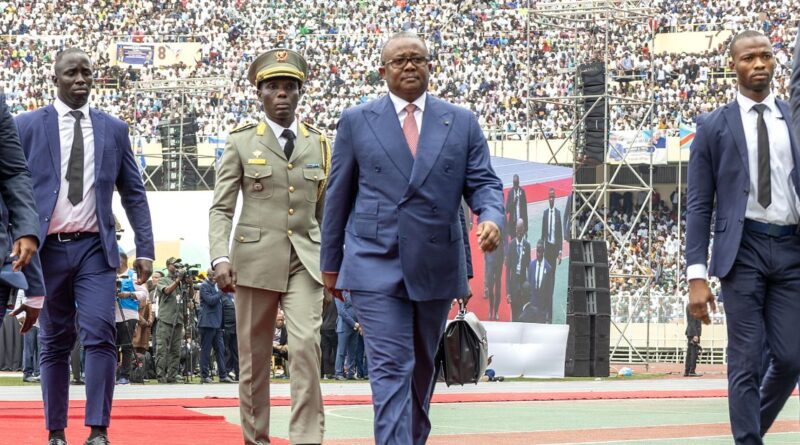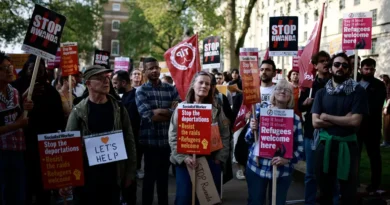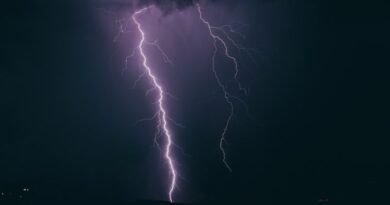Guinea-Bissau: The tug-of-war over governance
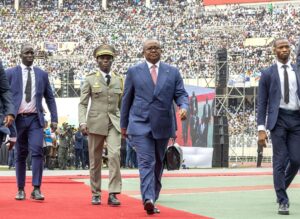 The president of a coup-prone West African nation, formerly an army general, sows instability to roll back a constitutional change that restricts his powers.
The president of a coup-prone West African nation, formerly an army general, sows instability to roll back a constitutional change that restricts his powers.
In a nutshell
- The West African region is backsliding into authoritarian rule
- The president of Guinea-Bissau is sidelining the legislature
- Instability and drugs trade are stunting the nation’s development
Guinea-Bissau in West Africa is caught in a vicious cycle of strongmen trumping the rule of law. Heads of military forces expect a share in patronage networks in return for propping up the authoritarians. The sense of entitlement among the military elite seems entrenched and continued sporadic chaos looks inevitable.
Since gaining independence from Portugal in 1974, the country – a global superpower in cashew nut production – has experienced four major coups as well as more than a dozen attempted coups. It has also endured a period of military government and civil war. Its sitting president, in office since 2020, has dismissed the legislature twice in two years, the last time in December 2023.
These developments highlight the roadblocks to democratizing the governance of African countries, and the close connection between these nations’ domestic politics and broader regional dynamics.
Embalo’s stormy presidency
While Guinea-Bissau’s chronic instability has long historical roots, the immediate cause of the current impasse stems from the 2019 presidential elections.
Domingos Pereira, the candidate of Guinea-Bissau’s leading political force, the African Party for the Independence of Guinea and Cape Verde (PAIGC), won the first round of balloting. However, after the second round, the National Electoral Commission (NEC) declared the winner to be Umaro Sissoco Embalo, the former army general and frontrunner of the Movement for Democratic Alternation Group of 15, a party formed by PAIGC dissenters.
The defeated candidate alleged fraud and demanded a recount. The country’s supreme court and the legislature had not recognized the results announced by the NEC, but Mr. Embalo pressed on to take office in a ceremony decried as a coup by his opponents. The Economic Community of West African States (ECOWAS), the region’s leading transnational organization, eventually recognized him as president, imbuing the new leader with a degree of international legitimacy.
Facts & figures
Factbox: ECOWAS
- Founded: 1975
- Members: 15 nations in West Africa: eight French-speaking, five English-speaking and two Portuguese-speaking
- Goals: Promoting economic integration, trade and monetary cooperation among members; fostering peace and security in the region
- Activities: Creating standardized external tariffs, removing trade barriers, coordinating infrastructure projects, mediating regional conflicts and deploying peacekeeping forces
- Challenges: Political instability in many member states, slow progress on economic integration and difficulties coordinating regional responses to security challenges
- Significance: Key player in West African development and security; also plays a role in infrastructure-building and shaping regional trade.
President Embalo’s first years in office were marked by his attempts to transform the country’s governance system from semi-presidential (the president serves as the head of state while the prime minister, selected by parliament, is the head of government, choosing ministers and setting the day-to-day agenda) to fully presidential.
The semi-presidential model was introduced in the 1993 revision of the country’s constitution as an attempt to strengthen the separation of powers during President Joao “Nino” Vieira’s abusive extended rule (1980-1999, and again from 2005 until his assassination in 2009).
President Embalo, a product of the old-school presidential system, followed the usual script of strong-armed leaders across the continent in his effort to roll it back. He initiated a constitutional change, attempted to gain control of the NEC and other critical institutions, and crimped freedom of the press. Before long, it became clear that the National Peoples’ Assembly was an obstacle to the president’s ambition: his constitutional amendment project failed to obtain the required two-thirds majority.
In February 2022, a coup attempt took place in the capital: the president announced that the army was not involved in it and responded with a wave of arrests of opposition figures.
In May of the same year, accusing deputies of graft and “persistent and insurmountable differences” between the parliament and other branches of power, President Embalo dissolved the parliament and dismissed the government. However, the snap legislative elections held in June 2023 (several months after the deadline specified by electoral law) ended with a decisive victory for a coalition of opposition groups, which secured an absolute majority in the parliament. The leaders of PAIGC wasted no time proposing a constitutional change to clarify the division of powers between the president and prime minister.
In response, the president assembled a shadow cabinet of “presidential advisors” (mainly from the army and security forces) to try to sideline the legislature and assume direct executive authority.
In December 2023, when Mr. Embalo was abroad, another shootout rocked the capital Bissau as his security force tried to rearrest two government officials who had been charged with corruption but were released by members of the opposition-controlled National Guard. Upon returning, the president dismissed the parliament again, accusing it of being behind a coup attempt and causing the government’s paralysis. He also temporarily dismissed Prime Minister Geraldo Martins.
Experts predict the next presidential election (legally mandated to be held in November 2024) will be a repetition of the 2019 contest between Mr. Embalo and Parliament Speaker Pereira. It will also mark another attempt by the small West African country to build a better system of institutional guardrails against abuse of power.
Endless coups and instability
Arguably, the main driver of instability in Guinea-Bissau is the generalized perception that the presidency calls all the shots.
A look at the broader picture is in order here. Powerful shifts of democratization within the international system took place in the 1990s, consisting of the introduction of democratic constitutions, multipartyism and the attempt to demilitarize political competition. These shifts mirrored earlier examples of what political scientist Samuel Huntington branded as “the third wave” of democratization (the previous two had taken place in the 1820s and 1940s, respectively). Yet, despite the developments, instability remained the norm in vast areas of the globe. In the case of Guinea-Bissau, that became clear when, after a brief period of stability and reforms, an attempted coup led to a bloody civil war (from June 1998 to May 1999).
-
Facts & figures
Africa’s crisis of democratic backsliding
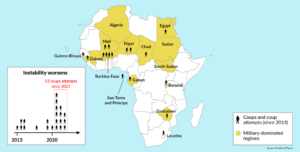
- According to the analysis of the Africa Center for Strategic Studies, “Building on long legacies of military government, the coups reflect African militaries’ attempts to reassert their perceived entitlement to rule.” Source: GIS
There are two additional factors behind Guinea-Bissau presidents’ attempts at consolidating power: the dominant role of the military, and ethnic vote manipulation by political actors. While the country features a vibrant civil society, politics is still determined by competition among the members of a political and military elite for the control of patronage networks.
This setup is both the cause and consequence of Guinea-Bissau’s economic dysfunction. With its monoculture agrarian economy (cashew nuts account for 95 percent of the exports and provide a livelihood to about 80 percent of the population), the country is one of Africa’s poorest, heavily dependent on foreign assistance. Uncertainty about taxes, the deterioration of the cashew nut trade due to lack of investment and a decline in demand suggest that the results of the 2024 production season – which started in March – may prove disappointing, as was the previous one. Unrest in Guinea-Bissau may cause supply shocks to global cashew nut sourcing.
Facts & figures
Guinea-Bissau vital economic indicators
- Territory: 36,125 sq. km (13,948 sq. miles), similar in size to Belgium
- Population size estimates: 2.19 million (Worldometer); 1.98 million (IMF)
- Age structure: 0-14 years: 42.5%; 15-64 years: 54.4%; 64 and older: 3.1%
- GDP (IMF): GDP growth: 5%; GDP current prices: $2.18 billion; GDP PPP* per capita: $1,100
- Military expenditure: 1.6% of GDP (World Bank)
*Purchasing power parity
Sources: CIA World Factbook, World Bank, IMF
Trade in illicit drugs emerged as the country’s newest source of income at the beginning of the 21st century: it has since become a transit hub for smugglers shipping drugs from Latin America to Europe. Cocaine enters Guinea-Bissau by sea or air and is moved through Mali and Niger to the European distribution networks. Beginning around 2005, elements of Bissau’s political and military elite have been pocketing dirty money from the traffickers. According to the UN Office on Drugs and Crime (UNODC), West Africa remains a key transit region for cocaine coming from Latin America. The amount of cocaine seized in the Sahel region has been increasing sharply since 2021.
Facts & figures
Transit routes for cocaine smuggling into Europe
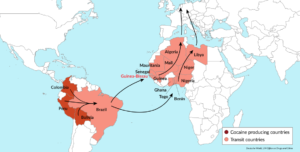
Drug money batters Guinea-Bissau with criminality, corruption, lack of political accountability and instability. Source: GIS
As a result, the United Nations designated Guinea-Bissau as Africa’s first “narco-state.” President Embalo touted fighting against drug trafficking as one of his priorities, but there have been no significant raids or drug seizures on his watch. The last considerable confiscation of narcotics in the country occurred in 2019, and little suggests that the problem has abated.
The regional dimension
Regional actors such as ECOWAS play a role in Bissau-Guinean politics. Under its Conflict Prevention Framework, introduced in 2008, ECOWAS has intervened in several security and political crises in West Africa, in an effort to implement what it calls a “zero-tolerance” policy on coups.
However, despite some notable successes, including the missions by ECOWAS’s multilateral armed forces in Liberia, Sierra Leone, Guinea-Bissau, Ivory Coast and the Gambia, irregular takeovers of power have been making a comeback across the region. That has been seen most recently in Mali, Burkina Faso, Chad or Guinea in 2021. Also, in key ECOWAS countries, such as Nigeria and Senegal, elections have been postponed.
Lacking consistency, a shared sense of purpose and adequate resources to make its “zero tolerance” stance stick, ECOWAS has refrained from intervening. In some cases, the organization, which must reckon with the prospect of disintegration as Mali, Niger and Burkina Faso have threatened to leave if sanctioned, has tacitly acknowledged unconstitutional power takeovers.
Scenarios
As of spring 2024, Guinea-Bissau is in political limbo, with prospects for change uncertain. The parliament remains dissolved, and legislative elections are not expected before the end of the rainy season in November. Moreover, the incumbent, whose term expires in February 2025, has suggested that the next presidential elections would not take place until November 2025, nine months after his term finishes. That would create a leadership vacuum and invite another wave of chaos in the country.
Most likely: Muddling through
More of the same looks likely: a power vacuum, entrenched drug trafficking, lack of economic viability. This will keep Guinea-Bissau stuck in a vicious cycle, preventing progress. Political volatility in Guinea-Bissau has deeper roots than electoral calendar machinations. It has an institutional and constitutional nature and is driven by the unresolved tensions regarding the powers of the president, the national assembly and the judiciary – all playing out amid attempts to “presidentialize” the regime. However, the opposition to dictatorial tendencies will likely continue in the country, as will the sense of entitlement among the military elite.
In the absence of constitutional changes and effective reform of the security sector, the tensions between the military and the opposition are bound to produce sporadic confrontations between security organizations attached to different political factions and society at large, and remain the leading obstacle to internal tranquility.
Grim economic outlook
The ongoing political instability and political deadlock do not bode well for the country’s economic future. In the absence of reforms, Guinea-Bissau will not be capable of maintaining its growing and increasingly urban population.
Developing the tourist sector, which is believed to hold attractive potential, would require significant investments in infrastructure and energy – not likely to materialize in the foreseeable future. The curse of insecurity is also a major hurdle to tourism: the 88-island Bissagos Archipelago in the Atlantic Ocean off the coast of Guinea-Bissau, for example, is a natural wonder but is also a key entry point for cocaine flowing into the country and the region.
Less likely: Significant deterioration in 2024
The situation in Guinea-Bissau may turn far worse if its festering political tensions spark armed clashes amid popular upheaval. Considering the volatility that currently characterizes West Africa and the Sahel, such unrest could accelerate the dynamics of ongoing regional disintegration, negatively impacting trade and security and exacerbating migration inside and out of the continent.
Growing chaos would also be a boon to insurgent groups and organized crime dealing in drugs, arms, fuel, gold and human trafficking that operate in the region.
credit:https://www.gisreportsonline.com/

